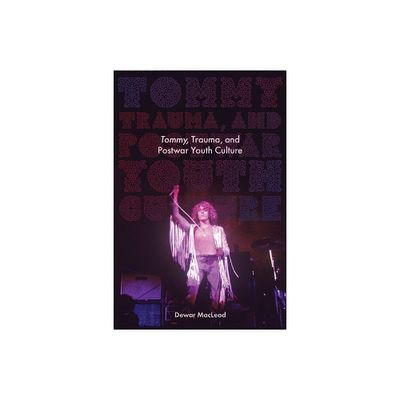Home
Tommy, Trauma, and Postwar Youth Culture
Loading Inventory...
Barnes and Noble
Tommy, Trauma, and Postwar Youth Culture
Current price: $19.95


Barnes and Noble
Tommy, Trauma, and Postwar Youth Culture
Current price: $19.95
Loading Inventory...
Size: Paperback
*Product Information may vary - to confirm product availability, pricing, and additional information please contact Barnes and Noble
Tommy
, Trauma, and Postwar Youth Culture
traces the development of one of rock music's central masterpieces and its relation to the social-cultural history of the era. Composer and guitarist Pete Townshend was the creative force behind the Who, one of Britain's greatest rock bands. Townshend grew up in an England decimated by the loss of life and hope that was the initial legacy of World War II. The product of a troubled childhood, Townshend faced ongoing struggles with sexual and personal trauma that colored his later work as a performer. An ambitious composer who wanted to create both pop hits and lasting personal works, Townshend achieved his greatest success with the Who through their 1969 rock opera,
. Townshend gave many accounts of the work's evolution and its significance to him and he participated in and encouraged its continued legacy. Dewar MacLeod recounts his own interactions with Townshend and
to draw out the work's impact, its critical reception, its place both in postwar history and the rock era, and its continuing relevance. This book will appeal to all interested in the history of rock, the creative process, and the long shadow of the 1960s.
, Trauma, and Postwar Youth Culture
traces the development of one of rock music's central masterpieces and its relation to the social-cultural history of the era. Composer and guitarist Pete Townshend was the creative force behind the Who, one of Britain's greatest rock bands. Townshend grew up in an England decimated by the loss of life and hope that was the initial legacy of World War II. The product of a troubled childhood, Townshend faced ongoing struggles with sexual and personal trauma that colored his later work as a performer. An ambitious composer who wanted to create both pop hits and lasting personal works, Townshend achieved his greatest success with the Who through their 1969 rock opera,
. Townshend gave many accounts of the work's evolution and its significance to him and he participated in and encouraged its continued legacy. Dewar MacLeod recounts his own interactions with Townshend and
to draw out the work's impact, its critical reception, its place both in postwar history and the rock era, and its continuing relevance. This book will appeal to all interested in the history of rock, the creative process, and the long shadow of the 1960s.


















